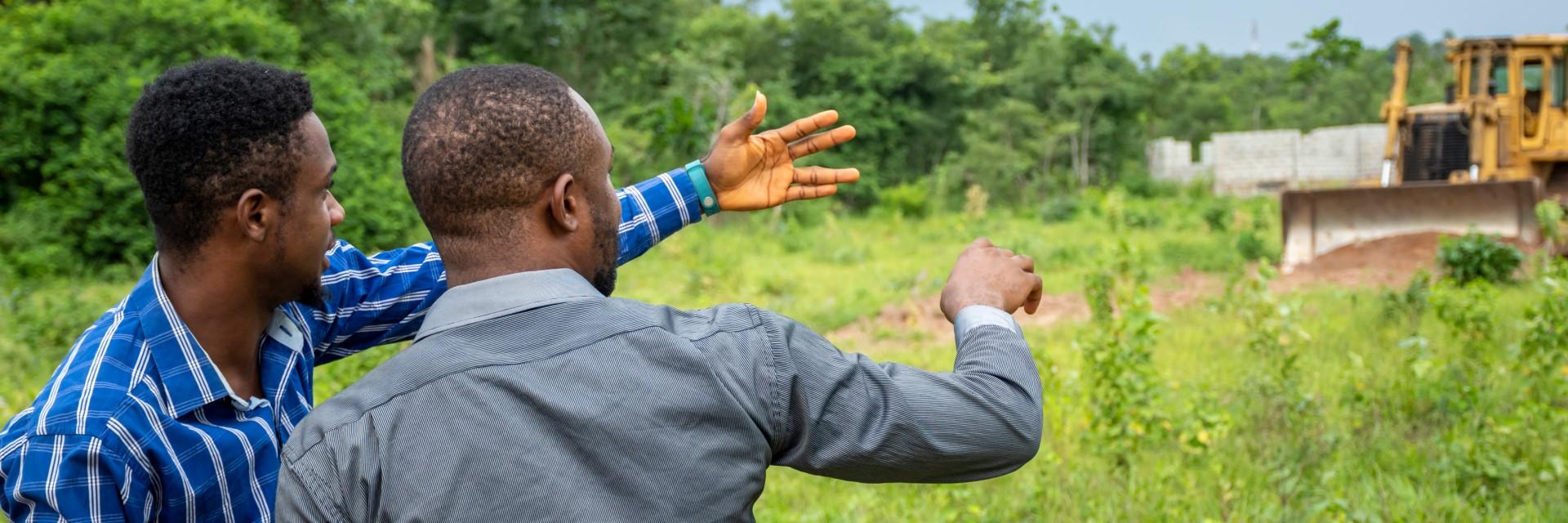Addis Ababa, 23 November 2023 - African countries should promote sustainable land governance in the acceleration of the implementation of the African Continental Free Trade Area (AfCFTA), agreed panelists during a panel session at the ongoing 2023 Conference on Land Policy in Africa.
Stephen Karingi, Director of the Regional Integration and Trade Division at the Economic Commission for Africa (ECA) said if fully implemented, the AfCFTA will boost intra-African trade by around 34.6% in 2045 equivalent to a gain of $204.3 billion. According to estimates by the ECA, this will bring substantial benefits to agrifood, services, industry and energy/mining sectors.
“Issues of land play an important part in this equation, because manufacturing and value addition will require raw materials to be produced on land; investments in value added sectors will also need access to land,” said Mr. Karingi in the panel session, themed Land Governance, Regional Integration and Intra-Africa Trade: Opportunities and Challenges.
In March 2023, the Democratic Republic of the Congo signed a framework agreement with Zambia and technical partners, including ECA and the African Export-Import Bank, to develop a transboundary special economic zone for batteries and electric vehicles and related services. This so-called new generation of special economic zones constitute one of several innovative ways to address the policy and infrastructure bottlenecks hampering opportunities for world class investment in strategic and green mineral-led industrialization.
Without land resources, we cannot optimize the AfCFTA; success will require harmonizing land laws across boundaries, said Mr. Karingi.
The flip side of the coin in the drive to increase trade and expand on requisite infrastructure is the question of sustainability. Mr. Karingi stressed the need to approach the nexus between land resources and the AfCFTA with a sustainability lens and said that a preliminary study by the ECA indicates that the AfCFTA if fully implemented will considerably increase African trade without adding significant pressure on climate change. Pursuing existing National Determined Contributions (NDCs) or establishing an African carbon market on top of the AfCFTA reforms would substantially reduce Green House Gas (GHG) emissions.
“Although there is a tradeoff between reducing GHG emissions and spurring economic benefits, establishing an African Carbon market is particularly effective at reducing GHG emissions, while largely preserving foreseen economic benefit from the AfCFTA,” said Karingi.
Tsotetsi Makong, head of Capacity Building and Technical Assistance in the AfCFTA Secretariat said Africa receives about 3.5% of the foreign direct investment (FDI). The connection between FDI and access to land, part of which lies in the hands of customary custodians and traditional leaders needs a regulatory framework.
“Most of these investments are in the extractives and commodities sector. The AfCFTA protocol on investment should foster intra African investment, which we are now calling African Direct Investments (ADI), so that Africans can freely invest on the continent and ensure that their investments are protected,” said Mr. Makong.
In the AfCFTA negotiations, land issues lie in the domain of domestic regulations. Assured land tenure and land security is the only way to support intra African investments, which Mr. Makong said, are still low in Africa. The success of the investment protocol under the AfCFTA will depend on countries’ domestic laws and the alignment of such laws with the AfCFTA.
“There are guidelines on land reforms that need to be turned into regulations within the domestic systems. Policy coherence has to be at the heart of what we do. This can be achieved by engaging everyone, including women and youth at the grassroots level,” said Mr. Makong.
Eileen Wakesho, Director, Community Land Protection at Namati, Kenya said the focus on AfCFTA is mainly on the movement of goods, services and people and the economic benefits to be accrued, however the biggest challenge is that access to land in Africa is not equal.
Data shows that between 2010 and 2020 in sub-Saharan Africa, 7.3 million hectares were leased or acquired, and less than 40% was eventually developed.
“Expansion of infrastructure requires land. The land is acquired but people are not compensated because they have no ownership. There is need to check on the cost and see if it benefits people,” she said.
Most large scale investments have low transparency rates during land acquisition stages and the consequences of this lack of transparency trickle down to women. As such, customary rights and land acquisition need attention. There is need for research on whether AfCFTA will weaken or strengthen the customary land rights.
Understanding the impact of the AfCFTA to customary rights and land acquisitions and learning from traditional authorities, including asking key questions such as does the AfCFTA require more land acquisition and whose land will be acquired?
“To harness the full potent of AfCFTA, African countries should ensure that land related investments do not dispossess existing land rights holders and instead promote inclusive and sustainable development,” she said.
Ishima Sanken’I VI, a traditional leader from Zambia said traditional leaders are usually not consulted on land management and governance decisions which has led to rampant land corruption. Traditional leaders, including kings need to be fully involved in decisions on land acquisition matters and use as they are the representative of the owners of the land.
The guidelines for the AfCFTA strategies require the whole of society – youth , SMESs, women and there is an emphasis on government leadership to bring everyone together, said Mr. Karingi. National implementation committees will be critical to the success of the strategies.
“The guidelines have been created which means that within the domestic frameworks, legislation can align. We are not going anywhere unless we go to the grassroots. Investment authorities need to countries to more attention,” added Makong.

